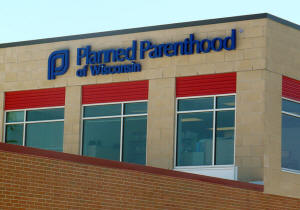Wisconsin Planned Parenthood pauses abortions amid federal Medicaid
funding cut
[September 26, 2025]
By SCOTT BAUER and GEOFF MULVIHILL
MADISON, Wis. (AP) — Planned Parenthood of Wisconsin will stop
scheduling patients for abortions starting next week as it works to find
a way to provide the service in the face of Medicaid funding cuts in
President Donald Trump's tax and spending bill, the nonprofit said
Thursday.
Abortion funding across the U.S. has been under siege, particularly
Planned Parenthood affiliates, which are the biggest provider. Wisconsin
appears to be the first state where Planned Parenthood is pausing all
abortions because of the new law.
The pause is expected to force women who would normally go to clinics in
southeast Wisconsin to look for other options, including traveling to
Chicago, which is within a three-hour drive of the Planned Parenthood
facilities.
Planned Parenthood warned of cuts
The organization has warned that about half its clinics that provide
abortion could be closed due to a ban on Medicaid funding for Planned
Parenthood for services other than abortion.
The measure was part of the tax and spending law Trump signed in July.
Initially, a judge said reimbursements must continue, but a federal
appeals court this month said the government could halt the payments
while a court challenge to the provision moves ahead.
Wisconsin is part of a similar multistate federal lawsuit challenging
the provision.

“It’s just fundamentally wrong to threaten critical healthcare funding,”
Wisconsin Democratic Attorney General Josh Kaul said Thursday. “But
unfortunately it’s consistent with what we’re seeing across the federal
government.”
Planned Parenthood provides a wide range of services including cancer
screenings and sexually transmitted infection testing and treatment.
Federal Medicaid money was already not paying for abortion, but
affiliates relied on Medicaid to stay afloat.
Wisconsin's abortion pause starts next week
Planned Parenthood of Wisconsin said in a statement that it is trying to
see as many patients as possible between now and Tuesday. The federal
law takes effect Wednesday. It is not scheduling patients for any type
of abortion beyond that date and the organization believes the move will
allow it to continue seeing other Medicaid patients. The organization
said it was working with providers across the state to make sure
patients are referred quickly and receive timely care.
It is also considering legal action, the group said.
“Planned Parenthood of Wisconsin will continue to provide the full
spectrum of reproductive health care, including abortion, as soon and as
we are able to,” Planned Parenthood of Wisconsin President and CEO Tanya
Atkinson said in the statement. “In the meantime, we are pursuing every
available option through the courts, through operations, and civic
engagement.”
The abortion landscape has been shifting frequently since the U.S.
Supreme Court ruling in 2022 that allowed states to ban abortion.
Currently, 12 states do not allow it at any stage of pregnancy, with
limited exceptions, and four more ban it after about six weeks’
gestation.
Illinois expecting to see a boost in patients
The bans have resulted in more women traveling for abortion and an
increased reliance on abortion pills. Prescribers in states where
they’re allowed have been shipping the pills to places where abortion is
banned, a practice that is facing some legal challenges and is expected
to attract more.
[to top of second column]
|

This undated photo shows the Madison South Health Center that is
owned and operated by Planned Parenthood of Wisconsin, in Madison.
(AP Photo/Kevin Wang)
 Megan Jeyifo, executive director of
the Chicago Abortion Fund, said she had an abortion in Wisconsin
years ago. She called the funding cuts a “backdoor abortion ban” in
Wisconsin and said she hopes Illinois will be a “beacon of access”
for patients from Wisconsin.
“We will not abandon people when they need us,” she said.
Dr. Allison Cowett, medical director for Family Planning Associates,
said they “anticipate a large influx of patients from Wisconsin.”
Both she and Jefiyo said they expect their organizations to increase
staffing in anticipation of patients traveling from Wisconsin.
“Illinois is ready and will be able to accept patients,” said
Adrienne White-Faines, CEO of Planned Parenthood of Illinois. “The
challenge is that this is not sustainable.”
Advocates have long described Illinois as an oasis for abortion
access for swaths of the Midwest and South that ban abortion. Nearly
a quarter of all out-of-state abortions took place in Illinois in
2024, according to the Guttmacher Institute, which supports abortion
access. About 35,000 patients traveled to Illinois for an abortion
last year, accounting for 39% of all abortions in the state,
according to the report.
Planned Parenthood performed 3,727 abortions in Wisconsin between
Oct. 1, 2023, and Sept. 30, 2024, the group said.
Wisconsin's long legal fight over abortions
The Wisconsin Supreme Court in July struck down the state's 1849
near-total ban on abortion, saying it was superseded by newer state
laws regulating the procedure.
Wisconsin's abortion ban was nullified in 1973, when the U.S.
Supreme Court decision in Roe v. Wade legalized abortion nationwide.
Legislators never officially repealed it, however, and conservatives
argue that the U.S. Supreme Court's ruling in 2022 reactivated it.

Planned Parenthood of Wisconsin stopped providing abortions after
that ruling for 15 months before resuming them as the lawsuit over
the state law played out. It has been providing abortions at three
clinics in Wisconsin for the past two years.
Affiliated Medical Services and Care for All also provide abortions
at clinics in Milwaukee.
Planned Parenthood of Wisconsin serves about 50,000 people, and
about 60% of them are covered by Medicaid, the organization said.
___
Mulvihill reported from Cherry Hill, New Jersey. Associated Press
reporter Christine Fernando in Chicago contributed.
All contents © copyright 2025 Associated Press. All rights reserved |